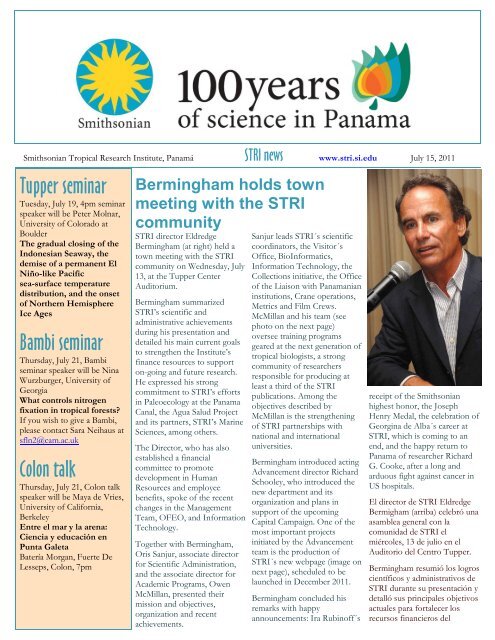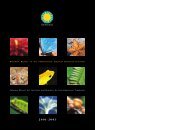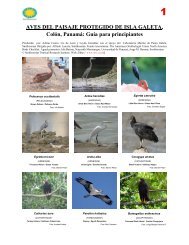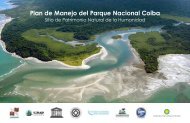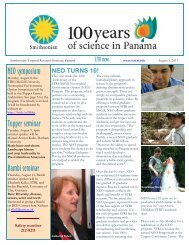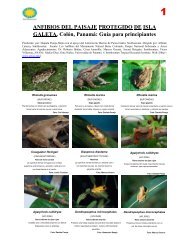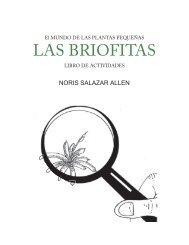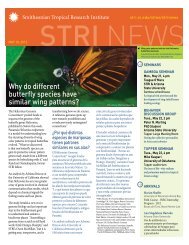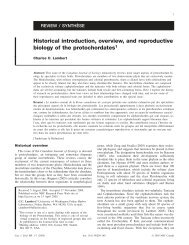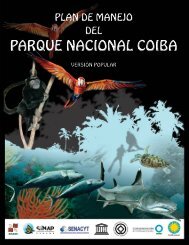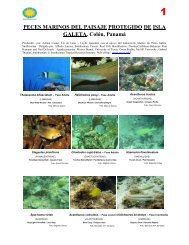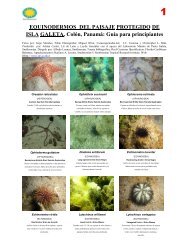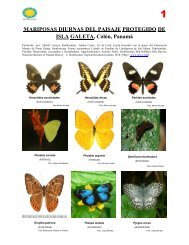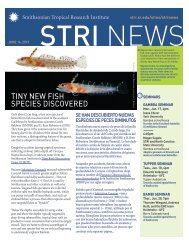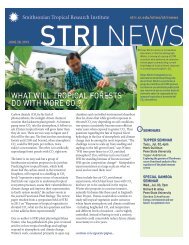Tupper seminar Bambi seminar Colon talk - Smithsonian Tropical ...
Tupper seminar Bambi seminar Colon talk - Smithsonian Tropical ...
Tupper seminar Bambi seminar Colon talk - Smithsonian Tropical ...
You also want an ePaper? Increase the reach of your titles
YUMPU automatically turns print PDFs into web optimized ePapers that Google loves.
<strong>Smithsonian</strong> <strong>Tropical</strong> Research Institute, Panamá STRI news www.stri.si.edu July 15, 2011<br />
<strong>Tupper</strong> <strong>seminar</strong><br />
Tuesday, July 19, 4pm <strong>seminar</strong><br />
speaker will be Peter Molnar,<br />
University of Colorado at<br />
Boulder<br />
The gradual closing of the<br />
Indonesian Seaway, the<br />
demise of a permanent El<br />
Niño-like Pacific<br />
sea-surface temperature<br />
distribution, and the onset<br />
of Northern Hemisphere<br />
Ice Ages<br />
<strong>Bambi</strong> <strong>seminar</strong><br />
Thursday, July 21, <strong>Bambi</strong><br />
<strong>seminar</strong> speaker will be Nina<br />
Wurzburger, University of<br />
Georgia<br />
What controls nitrogen<br />
fixation in tropical forests?<br />
If you wish to give a <strong>Bambi</strong>,<br />
please contact Sara Neihaus at<br />
sfln2@cam.ac.uk<br />
<strong>Colon</strong> <strong>talk</strong><br />
Thursday, July 21, <strong>Colon</strong> <strong>talk</strong><br />
speaker will be Maya de Vries,<br />
University of California,<br />
Berkeley<br />
Entre el mar y la arena:<br />
Ciencia y educación en<br />
Punta Galeta<br />
Batería Morgan, Fuerte De<br />
Lesseps, <strong>Colon</strong>, 7pm<br />
Bermingham holds town<br />
meeting with the STRI<br />
community<br />
STRI director Eldredge<br />
Bermingham (at right) held a<br />
town meeting with the STRI<br />
community on Wednesday, July<br />
13, at the <strong>Tupper</strong> Center<br />
Auditorium.<br />
Bermingham summarized<br />
STRI’s scientific and<br />
administrative achievements<br />
during his presentation and<br />
detailed his main current goals<br />
to strengthen the Institute’s<br />
finance resources to support<br />
on-going and future research.<br />
He expressed his strong<br />
commitment to STRI’s efforts<br />
in Paleoecology at the Panama<br />
Canal, the Agua Salud Project<br />
and its partners, STRI’s Marine<br />
Sciences, among others.<br />
The Director, who has also<br />
established a financial<br />
committee to promote<br />
development in Human<br />
Resources and employee<br />
benefits, spoke of the recent<br />
changes in the Management<br />
Team, OFEO, and Information<br />
Technology.<br />
Together with Bermingham,<br />
Oris Sanjur, associate director<br />
for Scientific Administration,<br />
and the associate director for<br />
Academic Programs, Owen<br />
McMillan, presented their<br />
mission and objectives,<br />
organization and recent<br />
achievements.<br />
Sanjur leads STRI´s scientific<br />
coordinators, the Visitor´s<br />
Office, BioInformatics,<br />
Information Technology, the<br />
Collections initiative, the Office<br />
of the Liaison with Panamanian<br />
institutions, Crane operations,<br />
Metrics and Film Crews.<br />
McMillan and his team (see<br />
photo on the next page)<br />
oversee training programs<br />
geared at the next generation of<br />
tropical biologists, a strong<br />
community of researchers<br />
responsible for producing at<br />
least a third of the STRI<br />
publications. Among the<br />
objectives described by<br />
McMillan is the strengthening<br />
of STRI partnerships with<br />
national and international<br />
universities.<br />
Bermingham introduced acting<br />
Advancement director Richard<br />
Schooley, who introduced the<br />
new department and its<br />
organization and plans in<br />
support of the upcoming<br />
Capital Campaign. One of the<br />
most important projects<br />
initiated by the Advancement<br />
team is the production of<br />
STRI´s new webpage (image on<br />
next page), scheduled to be<br />
launched in December 2011.<br />
Bermingham concluded his<br />
remarks with happy<br />
announcements: Ira Rubinoff´s<br />
receipt of the <strong>Smithsonian</strong><br />
highest honor, the Joseph<br />
Henry Medal, the celebration of<br />
Georgina de Alba´s career at<br />
STRI, which is coming to an<br />
end, and the happy return to<br />
Panama of researcher Richard<br />
G. Cooke, after a long and<br />
arduous fight against cancer in<br />
US hospitals.<br />
El director de STRI Eldredge<br />
Bermigham (arriba) celebró una<br />
asamblea general con la<br />
comunidad de STRI el<br />
miércoles, 13 de julio en el<br />
Auditorio del Centro <strong>Tupper</strong>.<br />
Bermingham resumió los logros<br />
científicos y administrativos de<br />
STRI durante su presentación y<br />
detalló sus principales objetivos<br />
actuales para fortalecer los<br />
recursos financieros del
Arrivals<br />
Sarah Hadman-Back, Amy<br />
Butterworth and Mary Higgs,<br />
University of Cambrdige, to<br />
assess the importance of<br />
litterfall for tree growth and<br />
nutrient dynamics by a large<br />
scale litter removal experiment<br />
in tropical deciduous forest in<br />
Panama, on BCI.<br />
Kevin Wolz, University of<br />
Illinois, Urbana-Champaign, to<br />
study elevation effects on the<br />
life history characteristics of<br />
tropical trees, in Fortuna.<br />
Wayne Souza, University of<br />
California at Berkeley, to study<br />
the patterns and mechanisms<br />
of canopy tree regeneration in<br />
a Caribbean mangrove forest,<br />
at Galeta.<br />
Mirjam Knoernschild,<br />
University of Ulm, Germany,<br />
to study local dialects in social<br />
vocalizations of the greater<br />
sac-winged bat Saccopteryx<br />
bilineata, on BCI.<br />
Sibylle Hassler, Universitat<br />
Postdam, Germany, to join the<br />
Agua Salud Project-Hydraulic<br />
Studies.<br />
Ludwig Jimenez, Universidad<br />
Nacional de Colombia, to<br />
study Neotropical stratigraphy,<br />
at the CTPA.<br />
Matthew Fagan, Columbia<br />
University, to study social and<br />
genetic determinants of<br />
eusocial behavior and kin<br />
recognition in Synalpheus<br />
snapping shrimps, at Bocas.<br />
Matthew Lutz, Princeton<br />
University, to study selforganizing<br />
structures in a<br />
distributed sensory network: A<br />
field study of bridge formation<br />
by the army ant Eciton burchelli,<br />
on BCI.<br />
Maria García, University of<br />
Panama, to conduct the<br />
project “Do lianas cause<br />
chronic disturbance and alter<br />
successional trajectories in<br />
tropical forests, on BCI.<br />
Instituto para apoyar los<br />
proyectos de investigación<br />
actuales y futuros. Expresó su<br />
fuerte compromiso con los<br />
esfuerzos de Paleoecología de<br />
STRI en el Canal de Panamá, el<br />
Proyecto de Agua Salud y sus<br />
socios, y las ciencias marinas,<br />
entre otros.<br />
El Director, quien también<br />
estableció un comité financiero<br />
para promover el desarrollo de<br />
Recursos Humanos y los<br />
beneficios de los empleados,<br />
habló de cambios recientes en<br />
el equipo administrativo,<br />
OFEO e Informática.<br />
Junto con Bermingham, Oris<br />
Sanjur, directora asociada para<br />
Administración Científica y<br />
Owen McMillan, director<br />
asociado para Programas<br />
Académicos presentaron su<br />
misión y objetivos, organización<br />
y recientes logros de sus<br />
departamentos.<br />
Sanjur lidera a los<br />
coordinadores científicos, la<br />
Oficina de Visitantes,<br />
Informática y BioInformática,<br />
la Iniciativa de Colecciones, la<br />
Oficina de Enlace con<br />
instituciones panameñas, las<br />
operaciones de las grúas,<br />
y la Oficina de Métricas y<br />
Filmaciones. McMillan y su<br />
equipo (foto abajo) supervisan<br />
la capacitación dirigida a forjar<br />
la futura generación de biólogos<br />
tropicales, una fuerte<br />
comunidad de investigadores<br />
responsables por más de una<br />
tercera parte de las<br />
publicaciones de STRI. Entre<br />
los objetivos descritos por<br />
McMillan está el fortalecer las<br />
asociaciones con universidades<br />
nacionales e internacionales.<br />
Bermingham presentó al<br />
director interino de<br />
“Advancement”, Richard<br />
Schooley, quien presentó al<br />
nuevo departamento, su<br />
organización y estrategia en<br />
apoyo de la próxima Campaña<br />
de institucional de Capital.<br />
Una de los proyectos más<br />
importantes del equipo de<br />
“Advancement” será la<br />
producción de la nueva página<br />
de web de STRI, cuyo<br />
lanzamiento está previsto para<br />
diciembre de este año.<br />
Bermingham concluyó sus<br />
comentarios con notas<br />
positivas: el nuevo honor que<br />
recibió Ira Rubinoff, la Medalla<br />
Joseph Henry, la celebración de<br />
las contribuciones profesionales<br />
de Georgina de Alba, y el feliz<br />
regreso a Panamá del<br />
investigador Richard Cooke,<br />
luego de una larga y difícil lucha<br />
contra el cáncer en hospitales<br />
de Estados Unidos.<br />
Adriana Bilgray, McMillan Nélida Gómez and Nilka Tejeira
Departures<br />
H. Lessios to Athens, Greece,<br />
on a short vacation.<br />
Roberto Ibañez to Curitiba,<br />
Brazil, to participate in the<br />
symposium "Amphibian<br />
Conservation in Latin America:<br />
Experiences and Perspectives"<br />
at the IX Latin American<br />
Congress of Herpetology.<br />
Owen McMillan to Bogota,<br />
Colombia, meet with colleagues<br />
and attend defense and<br />
committee meetings for<br />
students at the Universidad de<br />
los Andes.<br />
Gloria Jovane to Melbourne,<br />
Australia, to attend the XVIII<br />
International Botanical<br />
Congress to be held in<br />
Melbourne, Australia.<br />
New publications<br />
Fernandez, Maria Jose, Dudley,<br />
Robert, and Bozinovic,<br />
Francisco. 2011. "Comparative<br />
energetics of the Giant<br />
hummingbird (Patagona gigas)."<br />
Physiological and Biochemical Zoology<br />
84(3): 333-340.<br />
Freestone, Amy L., Osman,<br />
Richard W., Ruiz, Gregory M.,<br />
and Torchin, Mark E. 2011.<br />
"Stronger predation in the<br />
tropics shapes species richness<br />
patterns in marine<br />
communities." Ecology 92(4):<br />
983-993.<br />
Hauber, Donald, Saltonstall,<br />
Kristin, White, David, and<br />
Hood, Craig. 2011. "Genetic<br />
variation in the common reed,<br />
Phragmites australis, in the<br />
Mississippi River delta marshes:<br />
Evidence for multiple<br />
introductions." Estuaries and<br />
Coasts 34(4): 851-862.<br />
Henry, Amanda G., Brooks,<br />
Alison S., and Piperno, Dolores<br />
R. 2011. "Reply to Collins and<br />
Copeland: Spontaneous<br />
gelatinization not supported by<br />
evidence." Proceedings of the<br />
National Academy of Sciences<br />
108(22): E146.<br />
Rubinoff granted Joseph<br />
Henry Medal<br />
SI secretary Wayne Clough (at<br />
right, in the photo) presented<br />
STRI director emeritus Ira<br />
Rubinoff (center) with the<br />
Institution’s highest distinction,<br />
the Joseph Henry Medal, on<br />
Thursday, July 14, at the<br />
<strong>Smithsonian</strong>’s Castle,<br />
Washington DC. The Joseph<br />
Henry Medal is given by the<br />
Board of Regents to individuals<br />
in recognition of their<br />
distinguished service,<br />
achievements, or contributions<br />
to the prestige and growth of<br />
the <strong>Smithsonian</strong> Institution.<br />
"A generous and astute<br />
visionary," Rubinoff built a<br />
modern research platform for<br />
tropical biology, contributing<br />
significantly to core scientific<br />
advancement in the US and<br />
Latin America. During 34 years<br />
as STRI director, he capitalized<br />
on Panama's unique position.<br />
He inspired more than $100<br />
million in donations and created<br />
an atmosphere of discovery as a<br />
champion of free inquiry and<br />
basic research. He achieved<br />
government support in both<br />
Panama and the US, and has<br />
been successful in urging policy<br />
makers to use scientific<br />
information as they make<br />
critical decisions.<br />
As the first marine scientist at<br />
STRI, Rubinoff took advantage<br />
of the unique natural<br />
experiment that Panama<br />
provides through its geographic<br />
position as a narrow isthmus<br />
and extended the Institute's<br />
scope beyond the tropical<br />
forests, fostering marine<br />
programs on both of Panama's<br />
coasts and across the tropical<br />
world. During his tenure as<br />
director, the number of<br />
permanent scientists grew from<br />
a handful to 35, with 300<br />
support staff and over 1000<br />
visiting scientists each year.<br />
Rubinoff has served on the<br />
boards of Panamanian and<br />
international organizations, was<br />
awarded the Order of Vasco<br />
Nuñez de Balboa by the<br />
Republic of Panama, is an<br />
elected Fellow of The American<br />
Association for the<br />
Advancement of Science, The<br />
Linnean Society of London and<br />
The American Academy of Arts<br />
and Sciences. In 2008, Rubinoff<br />
New publications<br />
Kapheim, Karen, Bernal,<br />
Sandra, Smith, Adam,<br />
Nonacs, Peter, and Wcislo,<br />
William. 2011. "Support for<br />
maternal manipulation of<br />
developmental nutrition in a<br />
facultatively eusocial bee,<br />
Megalopta genalis; (Halictidae)."<br />
Behavioral Ecology And<br />
Sociobiology 65(6): 1179-1190.<br />
Myers, Jonathan A., and<br />
Harms, Kyle E. 2011. "Seed<br />
arrival and ecological filters<br />
interact to assemble<br />
high-diversity plant<br />
communities." Ecology 92(3):<br />
676-686.<br />
Robertson, Jeanne M., and<br />
Vega, Andres. 2011. "Genetic<br />
and phenotypic variation in a<br />
colourful treefrog across five<br />
geographic barriers." Journal of<br />
Biogeography doi:<br />
10.1111/j.1365-2699.2011.02<br />
548.x<br />
Rosenthal, Gil G., and Ryan,<br />
Michael J. 2011. "Conflicting<br />
preferences within females:<br />
sexual selection versus<br />
species recognition." Biology<br />
Letters 7(4): 525-527.<br />
Schafer, Priska, Fortunato,<br />
Helena, Bader, Beate,<br />
Liebetrau, Volker, Bauch,<br />
Thorsten, and Reijmer, John<br />
J.G. 2011. "Growth rates and<br />
carbonate production by<br />
coralline red algae in<br />
upwelling and non-upwelling<br />
settings along the Pacific<br />
coast of Panama." Palaios<br />
26(7): 420-432.<br />
Sjögersten, Sofie, Cheesman,<br />
Alexander, Lopez, Omar, and<br />
Turner, Benjamin. 2011.<br />
"Biogeochemical processes<br />
along a nutrient gradient in a<br />
tropical ombrotrophic<br />
peatland." Biogeochemistry<br />
104(1): 147-163.
New publications<br />
Vallo, Peter, Benda, Petr,<br />
Martinkova, Natalia, Kanuch,<br />
Peter, Kalko, Elisabeth K.V.,<br />
Cerveny, Jaroslav, and Koubek,<br />
Petr. 2011. "Morphologically<br />
uniform bats Hipposideros aff.<br />
Ruber (Hipposideridae) exhibit<br />
high mitochondrial genetic<br />
diversity in Southeastern<br />
Senegal." Acta Chiropterologica<br />
13(1): 79-88.<br />
Winter, Klaus, Garcia, Milton,<br />
and Holtum, Joseph A.M. 2011.<br />
"Drought-stress-induced<br />
up-regulation of CAM in<br />
seedlings of a tropical cactus,<br />
Opuntia elatior, operating<br />
predominantly in the C3<br />
mode." Journal of Experimental<br />
Botany 62(11): 4037-4042.<br />
Winter, Klaus, and Holtum,<br />
Joseph A.M. 2011. "Induction<br />
and reversal of crassulacean<br />
acid metabolism in Calandrinia<br />
polyandra: Effects of soil<br />
moisture and nutrients."<br />
Functional Plant Biology 38(7):<br />
576-582.<br />
Yavitt, Joseph B., Harms, Kyle<br />
E., Garcia, Milton N.,<br />
Mirabello, Matt J., and Wright,<br />
S. Joseph. 2011. "Soil fertility<br />
and fine root dynamics in<br />
response to 4 years of nutrient<br />
(N, P, K) fertilization in a<br />
lowland tropical moist forest,<br />
Panama." Austral Ecology 36(4):<br />
433-445.<br />
Zarowiecki, Magdalena, Loaiza,<br />
Jose R., and Conn, Jan E. 2011.<br />
"Towards a new role for vector<br />
systematics in parasite control."<br />
Parasitology<br />
doi:10.1017/S003118201100062X<br />
STRI in the news<br />
“Six-million-year-old whale<br />
fossil discovered by NMNH<br />
researchers in Panama” by<br />
Jeanne Maglaty. 2011. SI<br />
Around the Mall (July 12).<br />
also received the Secretary´s<br />
Gold Medal, presented by<br />
Cristián Samper (at left) in<br />
Panama, for exemplary service<br />
to the <strong>Smithsonian</strong>.<br />
Throughout his career,<br />
Rubinoff made sure that young<br />
scientists and students could<br />
meet and interact with<br />
prestigious scientists in the<br />
fields of ecology and evolution.<br />
"Ira has a clear vision of STRI<br />
as an intellectual community, of<br />
STRI in Panama, and of STRI<br />
in the world," said STRI’s Mary<br />
Jane West-Eberhard, "and<br />
above all, he has listened to us<br />
and been a friend."<br />
According to the words of SI<br />
secretary Wayne Clough during<br />
the award ceremony, Rubinoff<br />
is “a believer in, and defender<br />
of, basic research and<br />
intellectual curiosity. He has<br />
passed that on to generations of<br />
scholars and scientists, and that<br />
may be his greatest legacy.”<br />
Remarks by Ira Rubinoff<br />
“I am most grateful to the<br />
Secretary and the Board of<br />
Regents for conferring the<br />
Joseph Henry Medal to me. As<br />
the first Secretary, Joseph<br />
Henry confronted many of the<br />
issues that shaped the<br />
Institution as we know it today.<br />
Working from the goal of<br />
‘increasing knowledge’ as it was<br />
presented in James Smithson's<br />
legacy to the United States and<br />
articulated most nobly by John<br />
Quincy Adams in the legislation<br />
of July 1, 1836, establishing the<br />
<strong>Smithsonian</strong> ‘…to furnish the<br />
means of acquiring knowledge<br />
is, therefore, the greatest benefit<br />
that can be conferred upon<br />
mankind. It prolongs life itself,<br />
and enlarges the sphere of<br />
existence.’<br />
“From the beginning of his<br />
term, Henry had to engage the<br />
contentious issue of whether<br />
the Institution would be<br />
devoted to pursuing basic<br />
research or only that which was<br />
obviously practical.”<br />
“At a meeting in this building in<br />
1852, he debated Senator<br />
Stephen A. Douglas (six years<br />
before his famous debates with<br />
President Lincoln). Douglas<br />
had criticized the <strong>Smithsonian</strong><br />
for wasting its funds on such<br />
esoteric research as studies of<br />
the moon rather than<br />
something useful, such as<br />
agriculture. Henry had<br />
responded that Douglas's<br />
criticism might be valid ‘if the<br />
highest cravings of the human<br />
soul were confined to the desire<br />
for good potatoes.’<br />
“A year later, Douglas again<br />
attacked the <strong>Smithsonian</strong> for its<br />
preoccupation with research of<br />
‘no practical bearing,’ such as<br />
studies of ‘sea weeds and such<br />
trash.’ Henry responded that<br />
he would rather blow up the<br />
<strong>Smithsonian</strong> and send the funds<br />
back to England than have the<br />
bequest used to establish an<br />
agricultural society, as Douglas<br />
had suggested.”<br />
“Much of my career at the<br />
<strong>Smithsonian</strong> – I have served 6<br />
Secretaries and was acquainted<br />
with three others -- I briefed<br />
16 Panamanian Presidents and<br />
13 U. S. Ambassadors and<br />
many legislators both in<br />
Washington and in Panama on<br />
the nature of the <strong>Smithsonian</strong><br />
and of the importance of our<br />
research mission.”<br />
“Sometimes, I was more<br />
successful than others, but it is<br />
interesting that no matter how<br />
directly, persuasively, and<br />
passionately you can provide<br />
examples of the value of basic<br />
research to mankind, such as<br />
the fact that Alexander Fleming<br />
wasn't looking for Penicillin<br />
when he found it, there are still<br />
those who don't get it. Perhaps<br />
they lack a certain intellectual<br />
curiosity gene, disabling their<br />
ability to see basic research<br />
—trying to understand the<br />
history of the universe or the<br />
evolution of life on earth—<br />
other than as dilettantish,<br />
immoral or in the modern<br />
terminology as examples of<br />
waste, fraud or abuse.”<br />
“Joseph Henry had Stephen<br />
Douglas, more recently we have<br />
had to contend with the likes of<br />
Senator Proxmire and his<br />
‘Golden Fleece Awards.’<br />
“I am most grateful to my<br />
friends, colleagues and my<br />
family for their help and<br />
encouragement in building the<br />
world's leading tropical research<br />
institute –a home for a group of<br />
scholars with a scope that<br />
embraces the world's tropics<br />
and that has, as well, provided<br />
many scientific innovations to<br />
research in the developed<br />
world. I wish to also<br />
acknowledge the forbearance of<br />
my superiors in this building<br />
during the last half century.<br />
They endured my<br />
impetuousness and singleminded<br />
pursuit of resources for<br />
scholarship at the <strong>Smithsonian</strong>.<br />
For some, perhaps only because<br />
I could be relied upon to board<br />
a plane and return to Panama at<br />
the end of the week of<br />
nagging.”<br />
“I am still devoted to the<br />
<strong>Smithsonian</strong>'s mission and, as<br />
ever, convinced of the causal<br />
relationship between increasing<br />
knowledge and the ultimate<br />
advance of human progress.”<br />
“Thank you all, so very much,<br />
for joining me this afternoon.”<br />
El secretario del <strong>Smithsonian</strong>,<br />
Wayne Clough (a la derecha, en<br />
página 3) hizo entrega de la<br />
Medalla Joseph Henry, la
máxima distinción de la<br />
Institución, al director emérito<br />
de STRI, Ira Rubinoff, el jueves<br />
14 de julio en el Castillo del<br />
<strong>Smithsonian</strong>, Washington DC.<br />
La Medalla Joseph Henry la<br />
concede el Comité de Síndicos,<br />
en reconocimiento de un<br />
servicio distinguido, logros o<br />
contribuciones al prestigio y<br />
crecimiento de la Institución<br />
<strong>Smithsonian</strong>.<br />
“Un visionario astuto y<br />
generoso,” Rubinoff construyó<br />
una moderna plataforma de<br />
investigación para la biología<br />
tropical, contribuyendo así<br />
significativamente al progreso<br />
científico en los Estados Unidos<br />
y América Latina. Durante 34<br />
años como director de STRI,<br />
capitalizó la posición única de<br />
Panamá. Atrajo más de $100<br />
millones en donaciones y creó<br />
una atmósfera fértil para<br />
descubrimientos como defensor<br />
de la libertad intelectual y las<br />
ciencias básicas. Rubinoff logró<br />
tanto el apoyo del gobierno de<br />
Panamá como el de los Estados<br />
Unidos y ha tenido éxito al urgir<br />
a políticos a usar la información<br />
científica al tomar decisiones<br />
críticas.<br />
Como primer biólogo marino<br />
en STRI, aprovechó la ventaja<br />
del experimento natural que<br />
ofrece Panamá como pequeño<br />
istmo y extendió el rango de<br />
acción del Instituto más allá de<br />
los bosques tropicales con<br />
programas marinos en ambas<br />
costas de Panamá y a través del<br />
mundo tropical. Durante su<br />
administración como director, el<br />
número de científicos<br />
permanentes del Instituto pasó<br />
de unos cuantos a 35, con un<br />
personal de apoyo de 300, y más<br />
de 1000 académicos visitantes.<br />
Rubinoff ha fungido como<br />
síndico en comités nacionales e<br />
internacionales, recibió la Orden<br />
de Vasco Núñez de Balboa de la<br />
República de Panamá y es<br />
miembro de la American<br />
Association for the<br />
Advancement of Science, la<br />
Linnean Society of London, y la<br />
Academia de Artes y Ciencias<br />
de los Estados Unidos. En<br />
2008, Rubinoff también recibió<br />
la Medalla de Oro del Secretario<br />
por servicio ejemplar en el<br />
<strong>Smithsonian</strong> por parte de<br />
Cristián Samper (a la izquierda,<br />
en páginas 3 y 4) en Panamá.<br />
A lo largo de su carrera,<br />
Rubinoff se aseguró de que los<br />
científicos jóvenes interactuaran<br />
con científicos de gran prestigio<br />
en los campos de la ecología y la<br />
evolución. “Ira tiene una visión<br />
clara de STRI como una<br />
comunidad intelectual, de STRI<br />
en Panamá, y de STRI en el<br />
mundo” dijo la científica Mary<br />
Jane West-Eberhard, y sobre<br />
todo, nos ha escuchado y ha<br />
sido un amigo.”<br />
De acuerdo a las palabras del<br />
secretario Clough durante la<br />
ceremonia de premiación,<br />
Rubinoff es “creyente y<br />
defensor de las ciencias básicas<br />
y la curiosidad intelectual. Y<br />
esto lo ha transmitido a<br />
generaciones de académicos y<br />
científicos, lo que es su mayor<br />
legado.”<br />
Palabras de Ira Rubinoff<br />
“Agradezco enormemente al<br />
Secretario y al Comité de<br />
Regentes por conferirme la<br />
Medalla Joseph Henry. Como al<br />
primer secretario, Joseph Henry<br />
confrontó muchas situaciones<br />
que moldearon a la Institución<br />
como la conocemos hoy. A<br />
partir del objetivo de<br />
‘enriquecer el conocimiento’<br />
establecido por el testamento de<br />
James Smithson a los Estados<br />
Unidos, y que quedó aún más<br />
claro por la legislación del 1ro<br />
de julio de John Quincy Adams<br />
que deja sentado que el<br />
<strong>Smithsonian</strong> ‘...suministraría las<br />
herramientas para adquirir el<br />
conocimiento, que es el mayor<br />
beneficio que se le puede<br />
ofrecer a la humanidad. Esto<br />
prolonga la vida misma, y<br />
engrandece la esfera de su<br />
existencia.’<br />
“Desde el principio de su<br />
período administrativo, Henry<br />
tuvo que encargarse de temas<br />
contenciosos, como que si la<br />
Institución se dedicaría a las<br />
investigaciones básicas, o a lo<br />
que era obviamente práctico.<br />
En una reunión en este edificio<br />
en 1852, debatió con el senador<br />
Stephen A. Douglas (seis años<br />
antes de sus famosos debates<br />
con el presidente Lincoln).<br />
Douglas había criticado al<br />
<strong>Smithsonian</strong> por desperdiciar<br />
fondos en estudios esotéricos<br />
como investigaciones de la luna<br />
en vez de algo útil, como la<br />
agricultura. Henry respondió<br />
que las críticas de Douglas<br />
podrían ser válidas ‘si las<br />
mayores ansias del alma humana<br />
estuvieran confinadas al deseo<br />
de comerse unas buenas papas.’<br />
“Un año después, Douglas<br />
volvió a atacar al <strong>Smithsonian</strong><br />
por su preocupación con<br />
investigaciones ‘que no tenían<br />
aplicación,’ como los estudios<br />
de ‘algas marinas y otra basura.’<br />
Henry respondió que él prefería<br />
volar al <strong>Smithsonian</strong> en pedazos<br />
y regresar los fondos a<br />
Inglaterra antes de usar el<br />
legado para establecer una<br />
sociedad de agricultura, como<br />
había sugerido Douglas.<br />
“Durante gran parte de mi<br />
carrera en el <strong>Smithsonian</strong> — he<br />
servido bajo seis secretarios y he<br />
conocido a otros tres— informé<br />
a 16 presidentes panameños, 13<br />
embajadores estadounidenses y<br />
muchos legisladores tanto en<br />
Washington como en Panamá,<br />
sobre la naturaleza del<br />
<strong>Smithsonian</strong> y la importancia de<br />
nuestra misión de investigación.<br />
Algunas veces tuve más éxito<br />
que otras, y es muy interesante<br />
que no importa qué tan directa,<br />
persuasiva o apasionadamente<br />
se ofrezcan ejemplos del valor<br />
de la investigación básica a la<br />
humanidad, como el hecho de<br />
que Alexander Fleming no<br />
estaba buscando la penicilina<br />
cuando la encontró; hay quienes<br />
todavía no lo entienden. Quizás<br />
les hace falta un cierto gen de<br />
curiosidad intelectual, lo que les<br />
imposibilita ver la investigación<br />
básica —tratar de entender la<br />
historia del universo o la<br />
evolución de la vida en la<br />
tierra— más allá de lo diletante<br />
o inmoral, o en términos<br />
modernos, como ejemplos del<br />
desperdicio, fraude o abuso.<br />
“Joseph Henry tenía a Stephen<br />
Douglas, pero recientemente<br />
también hemos tenido que lidiar<br />
con personas como el senador<br />
Proxmire y sus ‘Premios del<br />
Vellocino de Oro.’<br />
"Estoy muy agradecido con mis<br />
amigos, colegas y mi familia por<br />
su ayuda y su incentivación en la<br />
construcción del instituto de<br />
investigaciones tropicales líder<br />
del mundo -el hogar de un<br />
grupo de académicos con una<br />
visión que abarca a los trópicos<br />
del mundo y que ha ofrecido<br />
muchas innovaciones científicas<br />
para la investigación en el<br />
mundo desarrollado. Deseo<br />
también reconocer la paciencia<br />
de mis superiores en este<br />
edificio durante el último medio<br />
siglo. Soportaron mi<br />
impetuosidad y mi obstinado<br />
deseo de obtener recursos para<br />
el desempeño académico del<br />
<strong>Smithsonian</strong>. Para algunos,<br />
quizás fue porque sabían que al<br />
final de una semana de tozuda<br />
insistencia, yo tomaría un avión<br />
y regresaría Panamá.”<br />
“Yo sigo dedicado a la misión<br />
del <strong>Smithsonian</strong> y, como<br />
siempre, estoy convencido de la<br />
relación causal entre el aumento<br />
del conocimiento y un mayor<br />
avance del progreso humano.”<br />
“Gracias a todos, muchas<br />
gracias, por unirse a mí esta<br />
tarde.”


